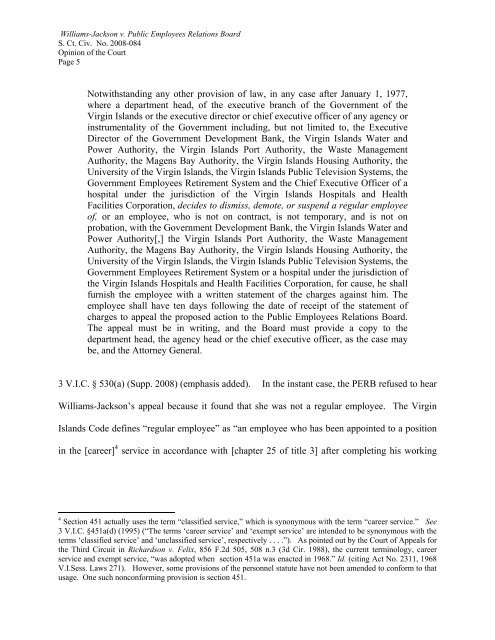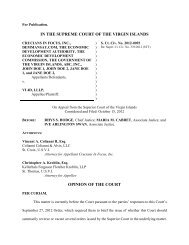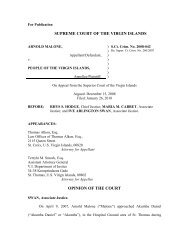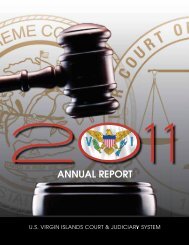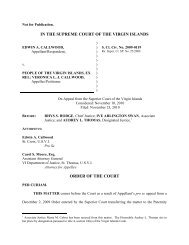IN THE SUPREME COURT OF THE VIRGIN ISLANDS OPINION OF ...
IN THE SUPREME COURT OF THE VIRGIN ISLANDS OPINION OF ...
IN THE SUPREME COURT OF THE VIRGIN ISLANDS OPINION OF ...
You also want an ePaper? Increase the reach of your titles
YUMPU automatically turns print PDFs into web optimized ePapers that Google loves.
Williams-Jackson v. Public Employees Relations Board<br />
S. Ct. Civ. No. 2008-084<br />
Opinion of the Court<br />
Page 5<br />
Notwithstanding any other provision of law, in any case after January 1, 1977,<br />
where a department head, of the executive branch of the Government of the<br />
Virgin Islands or the executive director or chief executive officer of any agency or<br />
instrumentality of the Government including, but not limited to, the Executive<br />
Director of the Government Development Bank, the Virgin Islands Water and<br />
Power Authority, the Virgin Islands Port Authority, the Waste Management<br />
Authority, the Magens Bay Authority, the Virgin Islands Housing Authority, the<br />
University of the Virgin Islands, the Virgin Islands Public Television Systems, the<br />
Government Employees Retirement System and the Chief Executive Officer of a<br />
hospital under the jurisdiction of the Virgin Islands Hospitals and Health<br />
Facilities Corporation, decides to dismiss, demote, or suspend a regular employee<br />
of, or an employee, who is not on contract, is not temporary, and is not on<br />
probation, with the Government Development Bank, the Virgin Islands Water and<br />
Power Authority[,] the Virgin Islands Port Authority, the Waste Management<br />
Authority, the Magens Bay Authority, the Virgin Islands Housing Authority, the<br />
University of the Virgin Islands, the Virgin Islands Public Television Systems, the<br />
Government Employees Retirement System or a hospital under the jurisdiction of<br />
the Virgin Islands Hospitals and Health Facilities Corporation, for cause, he shall<br />
furnish the employee with a written statement of the charges against him. The<br />
employee shall have ten days following the date of receipt of the statement of<br />
charges to appeal the proposed action to the Public Employees Relations Board.<br />
The appeal must be in writing, and the Board must provide a copy to the<br />
department head, the agency head or the chief executive officer, as the case may<br />
be, and the Attorney General.<br />
3 V.I.C. § 530(a) (Supp. 2008) (emphasis added). In the instant case, the PERB refused to hear<br />
Williams-Jackson’s appeal because it found that she was not a regular employee. The Virgin<br />
Islands Code defines “regular employee” as “an employee who has been appointed to a position<br />
in the [career] 4 service in accordance with [chapter 25 of title 3] after completing his working<br />
4 Section 451 actually uses the term “classified service,” which is synonymous with the term “career service.” See<br />
3 V.I.C. §451a(d) (1995) (“The terms ‘career service’ and ‘exempt service’ are intended to be synonymous with the<br />
terms ‘classified service’ and ‘unclassified service’, respectively . . . .”). As pointed out by the Court of Appeals for<br />
the Third Circuit in Richardson v. Felix, 856 F.2d 505, 508 n.3 (3d Cir. 1988), the current terminology, career<br />
service and exempt service, “was adopted when section 451a was enacted in 1968.” Id. (citing Act No. 2311, 1968<br />
V.I.Sess. Laws 271). However, some provisions of the personnel statute have not been amended to conform to that<br />
usage. One such nonconforming provision is section 451.


